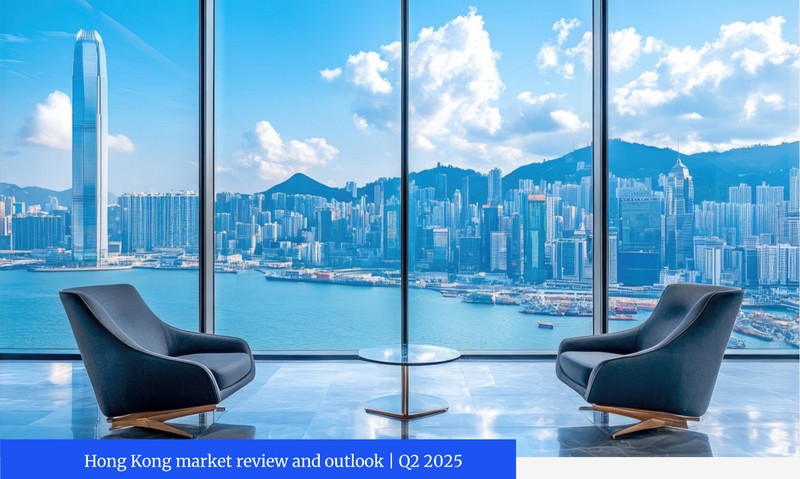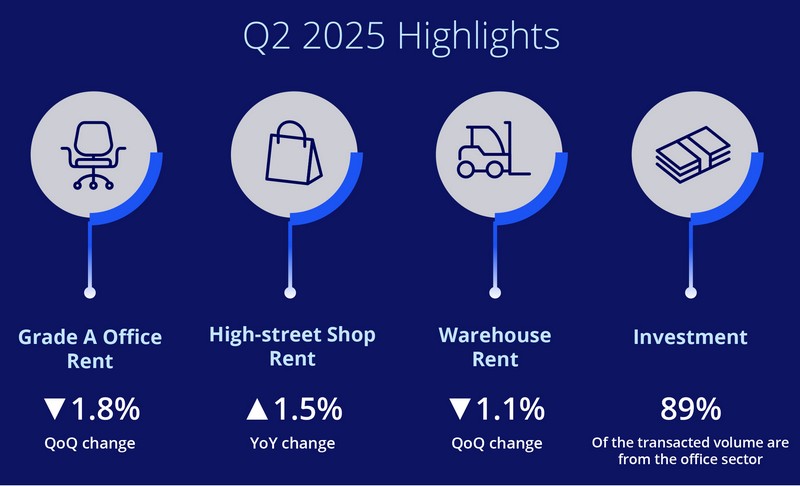HONG KONG, 3rd July 2025 – Leading diversified professional services and investment management company Colliers (NASDAQ and TSX: CIGI) has released its Quarterly Market Report | Q2 2025, highlighting a cautiously optimistic shift in Hong Kong’s real estate landscape.
Investment Market Rebounds While Office and Industrial Sectors Face Mounting Supply Pressures
While the office and industrial sectors continue to grapple with supply and demand imbalances, the investment market showed signs of revival, and retail leasing remained active in core locations.
“The second quarter saw a notable rebound in investment value despite fewer transactions, driven by landmark deal and the falling borrowing costs. Meanwhile, the office and industrial sectors remain under pressure from new supply and cautious occupier demand, further driving rents down by year-end. Retail leasing remained active, particularly in prime locations, despite softer sales performance, “ said Kathy Lee, Head of Research and Retail Consultancy at Colliers Hong Kong.

EvotoFiona Ngan, Kathy Lee, Thomas Chak
Office
The Grade A office market recorded a positive net take-up of 0.3 million sq. ft. in Q2, reversing the negative absorption seen in Q1. Central/Admiralty led the recovery with 75,000 sq. ft. of positive net take-up, reflecting a short-term rebound in leasing activity.
The overall vacancy rate remained high at 17.3% in Q2, with further increases expected as 3 million sq. ft. of new supply is scheduled for H2 2025 and another 2 million sq. ft. in 2026. Rents continued to decline, falling 1.8% QoQ and 4.7% YTD, with Island East experiencing the steepest drop at 4.1% QoQ.
“We anticipate vacancy rates to ascend to approximately 19% by the end of 2025, based on current completion and pre-commitment information. The market is facing a significant supply-demand imbalance. With average annual net take-up in 2023–2024 at just 0.45 million sq. ft., it will take several years to absorb the upcoming stocks and Grade A office rents are projected to decline by 10% in 2025. Landlords are increasingly adopting flexible leasing strategies to remain competitive,” said Fiona Ngan, Head of Occupier Services at Colliers Hong Kong.
Retail
Retail leasing activity remained robust in Q2, particularly in major high streets and prime shopping malls, despite a 5.6% YoY decline in retail sales during the first four months of 2025. High-street rents rose 1.5% YoY, supported by expansions and relocations from local, mainland, and international brands.
Vacancy rates remained stable, and the limited availability of prime space is expected to support a 3% rental growth for the year. However, a persistent gap between landlord expectations and tenant budgets may temper leasing momentum in the near term.
“Retailers are focusing on core districts, yet they adopted a cautious and strategic approach amid market uncertainties,“ said Kathy Lee, Head of Research and Retail Consultancy at Colliers Hong Kong.
Industrial
The industrial sector continued to face headwinds, with rents falling 1.1% QoQ and 5.0% YoY. Despite strong trade figures early in the year—likely due to front-loaded exports ahead of tariff anticipation—warehouse demand remained subdued amid geopolitical uncertainty and weak business sentiment.
“With vacancy pressure mounting due to a substantial supply pipeline and demand lagging, landlords are increasingly offering flexible terms in both new leases and renewals. We expect industrial rents to decline by a total of 5% by year-end,” commented Fiona Ngan, Head of Occupier Services at Colliers Hong Kong.
Capital Markets
Hong Kong’s investment market began to show signs of stabilization in Q2 2025, supported by easing borrowing costs and improving investor sentiment. Q2 saw a 33% QoQ increase in investment value, reaching HKD 8.3 billion, despite a drop in deals from 18 in Q1 to 10 in Q2. The standout transaction was HKEX’s HKD 6.3 billion acquisitions of nine office floors and multiple retail units at One Exchange Square, accounting for the majority of the quarter’s transaction value.
Office assets dominated the market, comprising 89% of total transaction value, while retail and hotel sectors remained relatively quiet. With 1-month HIBOR falling below 1% and HKD time deposit rates under 2%, real estate is becoming more attractive, prompting high-net-worth individuals to reallocate funds into higher-yield, long-term assets.
“As financial sentiment improves, we expect growing interest in office, hotel and en-bloc residential. Banks will likely resume mortgagee sales in H2 as macroeconomic conditions stabilise. Separately, the government’s push for student housing and conversions is also drawing investor attention,” commented Thomas Chak, Head of Capital Markets & Investment Services at Colliers Hong Kong.














